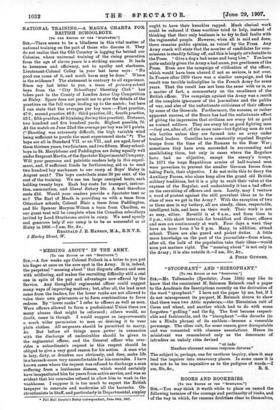"MESSING ABOUT" IN THE ARMY.
(To TRI EDITOR Or UR .SPROTAT08.1
Sra,—A few weeks ago Colonel Pollock in a letter to you put his finger at once on the sore spot in the Army. It is, indeed, the perpetual "messing about" that disgusts officers and men with soldiering, and makes the recruiting difficulty still a real one in spite of the pay and advantages now offered by the Service. Any thoughtful regimental officer could suggest many ways of improving matters; but, after all, the lead must come from the leaders, for the lower ranks are not allowed to voice their own grievances or to form combinations to force redress. By "lower ranks" I refer to officers as well as men. Were officers allowed to form a professional Union there are many abuses that might be reformed ; others would, no doubt, come in though. I would, suggest as improvements a much wider permission to men so desiring it to wear plain clothes. All sergeants should be permitted to marry, &c. But before all things more power in connexion with the discharge of undesirables should be given to the regimental officer, and the General officer who over- rides a subordinate's request in this respect should . be obliged to give a very good reason for his action. A man who is lazy, dirty, or drunken can obviously, and does, make life in a barrack-room very uncomfortable-for his comrades. I have known cases where the request was refused to discharge a man suffering from a loathsome disease, which would certainly have incapacitated him for years from active service, and was so evident that his comrades refused to allow him to wash in the washhonse. I suppose it is too much to expect the British taxpayer to renovate and modernise all the barracks. Ob. otructionista in Staff, and particularly in Departmental, eraploy
• Pall Mall Gazette's Bisley correspondent, June 24th, 1907.
ought to have their knuckles rapped. Much clerical work could be reduced if these worthies tried to help, instead of thinking that their only business is to try to find faults with the regimental people. However, when all is said and done, there remains public opinion, as voiced by the Press. Any Army coach will state that the number of candidates for com- missions is steadily falling off, and this is largely attributable to the Press. "Give a dog a bad name and hang him." You have quite unfairly given the Army a bad name, you gentlemen of the Press. Even now the campaign of vilification of the officer, which would have been absurd if not so serious, is not over. In France after 1870 there was a similar campaign, and the result was terrible indiscipline in the French Army for some years. That the result has not been the same with us is, as a matter of fact, a commentary on the excellence of the British officer. The campaign against the Army was a result of the complete ignorance of the journalists and the public of war, and also of the unfortunate criticisms of their officers by some of the Generals. Furthermore, the success, or rather apparent success, of the Boers has had the unfortunate effect of giving the impression that civilians are every bit as good as trained soldiers. They are every bit as good fighting men —they are, after all, of the same race—but fighting men do not win battles unless they are formed into an army under trained leaders. Guerillas have constantly repulsed Regular troops from the time of the Romans to the Boer War; sometimes they have even succeeded in surrounding and annihilating them, but only in eases where the Regulars have had no objective, except the enemy's troops. In 1871 the huge Republican armies of half-trained men were powerless to prevent the smaller German forces from taking Paris, their objective. I do not write this to decry the Auxiliary Forces, who alone keep alive the grand old British military traditions, but it is a pity to exalt their value at the expense of the Regular, and undoubtedly it has a bad effect on the recruiting of officers and men. Lastly, may I venture a word of protest against the still prevalent ideas as to the class of men we get in the Army ? With the exception of two or three men in my battery, all are steady, clean, respectable, intelligent lads, and keen on their work. Their work is not so easy, either. Reveille is at 6 a.m., and from then to 3 p.m., with short intervals for breakfast and dinner, officers and men are continuously at work. Four days a week they have an hour from 5 'to 6 p.m. Many, in addition, attend school. There are also guard and picket duties. A little more knowledge on the part of the journalists—from whom, after all, the bulk of the population take their ideas—would soon put matters right. The "messing about" is not only in the Army ; it is also outside it. —I am, Sir, &c., A FIELD GIINNEE.
















































 Previous page
Previous page